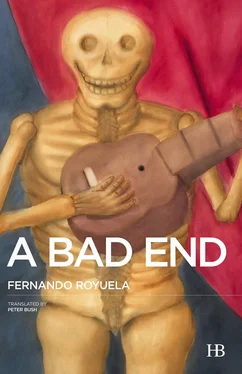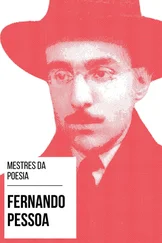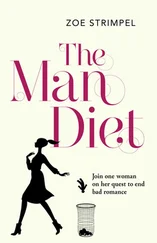Fernando Royuela - A Bad End
Здесь есть возможность читать онлайн «Fernando Royuela - A Bad End» весь текст электронной книги совершенно бесплатно (целиком полную версию без сокращений). В некоторых случаях можно слушать аудио, скачать через торрент в формате fb2 и присутствует краткое содержание. Год выпуска: 2016, Издательство: Hispabooks, Жанр: Современная проза, на английском языке. Описание произведения, (предисловие) а так же отзывы посетителей доступны на портале библиотеки ЛибКат.
- Название:A Bad End
- Автор:
- Издательство:Hispabooks
- Жанр:
- Год:2016
- ISBN:нет данных
- Рейтинг книги:3 / 5. Голосов: 1
-
Избранное:Добавить в избранное
- Отзывы:
-
Ваша оценка:
- 60
- 1
- 2
- 3
- 4
- 5
A Bad End: краткое содержание, описание и аннотация
Предлагаем к чтению аннотацию, описание, краткое содержание или предисловие (зависит от того, что написал сам автор книги «A Bad End»). Если вы не нашли необходимую информацию о книге — напишите в комментариях, мы постараемся отыскать её.
A Bad End — читать онлайн бесплатно полную книгу (весь текст) целиком
Ниже представлен текст книги, разбитый по страницам. Система сохранения места последней прочитанной страницы, позволяет с удобством читать онлайн бесплатно книгу «A Bad End», без необходимости каждый раз заново искать на чём Вы остановились. Поставьте закладку, и сможете в любой момент перейти на страницу, на которой закончили чтение.
Интервал:
Закладка:
Sergeant Ceballos was a coward of the old school, a man who was ill served by his own limitations and only lost his temper with weaklings, but think on this, in the end he got it wrong and paid for his arrogance with his life. He was probably drunk when he caught the gypsies stealing pears, if not, there’s no accounting for his deed, or perhaps he just underestimated the race; that night he received his just desserts in stab wounds. He met a bad end, though it could have been worse if the wolves had come and gorged on his corpse, still clad in the Civil Guard uniform, as indeed it was, but that was not to be. Things happen the way they do, and not as people might want them to. My forehead emerged badly from the lesson he taught me, and learning Gustavo Adolfo’s poetry by heart did me no good. The pain went deep, and though it flowered from my head, its shoots actually sprang from my soul. I left the trough battered and limp and walked to my mother’s house with my head split open. Despite the pain, I kept imagining a thousand kinds of revenge that were all quite fantastic and impossible. It’s incredible what the human mind can spawn. Over the years I have learned to classify my emotions; initially I was helped by the regular kicks that came my way, but later, particularly after the designs of Providence led me to the ranks of the great and the good, I met with scorn the smiles of hypocrites, faced out with aloofness the mellifluous tones of flatterers, ranted with anger against the pettiness of the wretched, and sought revenge to soothe wounds that hadn’t healed and were still sore. “Whatever can have become of little Margarita?” I wondered one night a long ways off from my childhood when malt whisky was clouding my memory with nostalgia’s tawny gold. Could she still be living in the village, or might she have moved off to a dormitory town where she now lived a life of disillusion in the barren wastes of menopause? Would she still remember the disabled dwarf who never had the courage to love her after that? Without giving it too much thought, I decided to clear up my doubts and contract the services of a detective agency to investigate where she’d holed up. I was curious to find out what the rough edges of time had done to my childhood’s most sublime desire, ineffable dreams that turn to ash when you wake up an adult, ash or mud, because the stuff of dreams is unstable and can be lethal, out of necessity. The detective they sent, a skinny, cadaverous fellow seemingly reared on lettuce leaves, didn’t flinch when I revealed his task: “I want you to find little Margarita Ceballos.” And he didn’t hesitate to charge me an exorbitant fee when he found her in Ciudad Real in a matter of days. As far as ordinary folk are concerned, dwarves are excrescences that must have sprouted like warts on an old woman’s face, and they cannot conceive how we can fall in love. Money, nevertheless, puts everything right. In his report, he wrote that little Margarita Ceballos had been driven into impoverished widowhood by the unpaid fines handed out to her cabdriver husband and now ran a tiny haberdashery where the most sold items were extraordinary knickers for fat women and bras like saucepans. Hers was a simple life, and she misspent the scant earnings from her shop on slot machines in bars or the Eldorado Bingo Palace, a haunt suitable for pensioners chastened by necessity. I jettisoned all the commitments in my diary, told my chauffeur in confidence of my destination, and arrived the following day. I’d not been to Ciudad Real for many years, probably since the last time I performed there with the Stéfano circus in ‘66, and the city seemed as anodyne as so many others across that Spain I visited in my youth, led by the hand of Stéfano di Battista. We reached the address in the report. I got out of the car and went over to the haberdashery. Before deciding to go inside, I took a look in the window. Through glass covered in squashed flies, I glimpsed a messy array of unfashionable lace and lingerie that hung from two racks that had faded in the yellow sun. Her back to me, on a ladder, little Margarita was putting boxes of stockings on metal shelves, and wasn’t I astonished when I registered the big-bang of her hips expanding before my eyes and what one might dub a Taj Mahal of a bum, gross buttocks, an extraordinary mass of flesh, such was the effect the passage of time had inflicted on my childhood love. After my initial shock, I started to laugh and heave with guffaws that blocked my windpipe. I opted not to go in. I would plot something that would adequately respond to my plans for her. Death, perhaps.
Time imprints its grotesque round on individuals — a molecular weight of seconds that accumulates into hours and distorts bodies. An advantage of being born a dwarf is that one takes one’s deformities in one’s stride; one isn’t forced to complain when they appear at different growth stages. If little Margarita had been stricter with her food, she might never have become so fat, but then again she might have. Providence makes its decisions in advance, and nobody, not even lunatics, can reverse them. Over the years I have learned to anticipate its diktats at every second and recognize its voice amid the sighs of despair and poverty and even the fanfares of opulence, and please believe me if I say my will has always yielded to its designs. The deadly dust of resignation gradually settles on life’s long, tortuous road, and nobody escapes the erosion of the flesh.
Faith clouds the intellect, stymies critical thought, and brings on death, although you might retort what is death when one dies for faith ? They tell the followers of Mohammed that if they die defending their faith, they will go to paradise. Sergeant Ceballos proclaimed his faith in his uniform, and look how he ended up, a paltry piece of flesh disemboweled at dawn by a flurry of stabs from a couple of rag-and-bone men. He must have been plastered on plonk. I shall never forget the way he looked at me in the trough, at once a bully and a coward. My blood streaked the water crimson, and the whites of the eyes of the mules that drank there turned ruby red, as if they were two blood clots rather than two pupils. Little Margarita begged her father to dunk my head under so she’d never have to look at it again, but he paid no heed and simply reiterated his threat: “If I find you within five miles of her, I’ll neuter you.”
I extricated myself from the trough as best I could; it wasn’t easy, it had a high parapet, and the strength had gone from my arms. I walked to my mother’s house, instinctively searching for relief like an injured dog wanting to be licked. I walked past my brother Tranquilino, who was lurking in the shadows of the poplar grove and about to practice with his slingshot by shooting a pebble in my direction, a slingshot he’d cleverly fashioned from a forked hazelnut branch so he could kill storks in flight. The poor fellow had the decency to abstain when he saw the blood streaming from me as if I were the carved wooden ecce homo statue they promenade in Holy Week amid heavy wax candles and pointed hoods. I should have said ecce homunculus , but Latin is a dead language useful only for deciphering the brief lives of the tenants of tombs. “Did they thrash you, Gregorito?” he asked when he saw me. “Fuck, you’re covered in blood,” and without more ado, off he went to kill birds or incinerate ants or waste the little life that was left to him on trivial pursuits before the train rolled over him, crash, bang, like a bevy of nightmares dissipated by the dawn.
My mother lived in a large, down-at-heel house. Everywhere was littered with piles of useless junk, survivors from bygone uses and days, from times that might have been happy. The entrance was a shadowy alcove off which staircases led to the kitchen and bedrooms. On the ground floor, righthand side, the door to the stable was open, a gloomy spot that reeked of the lingering stench of guts even though there were no animals. A handful of hens clucking out of tradition still lived there, bereft of company and perching on posts. The rest was pure absence. Mules, donkeys, sheep, and pigs had left their mark on the walls, and aromas from their butchered fates hung visibly between shards of light that seeped through a large window crucified by a wrought-iron grill. The remains of a small hutch still stood in one corner; my mother’s father-in-law had built it with wire and wood to house rabbits and hares, wild creatures that capered in the fields before the starving adversaries of ‘36 cleaned them out tooth and nail as they were shooting left and right in these lands God once threw up. “God doesn’t exist,” intoned my brother Tranquilino with the conviction of a fool. “God doesn’t exist, mother told me so,” then he walked off quite full of himself, jumping hysterically and kicking the air like a donkey. That midday when Sergeant Ceballos taught me a lesson on the trough in the plaza, I’d probably have rather sought refuge and relief in those shadowy stables and the melancholy of Gustavo Adolfo’s Rhymes . Grief best and most bitterly wallows in its own impotence when in solitude. I would have done so with pleasure, perhaps for the last time, but my head was on fire, and spilt blood was quick to dowse my desires with its outrageous hues, so I decided to go up to the kitchen and wait for my mother. I laid down on the bench we kept next to the pantry wall. My thoughts were buzzing like a legion of flies gorging on the honey of my ideas. I spent the whole afternoon there and a good part of that night, with no food or drink, restless and queasy, until my mother returned from El Paquito’s. Perhaps my raging temperature gave me a few hours’ sleep; perhaps I dreamt of a lake of rose petals where little Margarita swam naked in my presence, unperturbed by my dwarfish deformities; perhaps I dreamt little Margarita shamelessly abandoned the florid water where she’d performed fantastic pirouettes and showed me firm extremities that I eyed eagerly, loving the way the water ran off her belly, until she was completely out of the pool and I gazed in terror at the disgusting dimensions of a male sex nestling in her groin like an elephant’s hairy trunk. Dreams may — or may not be — meaningless. Dreams are unforeseen happenings that often torture us with their tangible unreality. Perhaps they are faint anticipations of death, horrific samples of the void that pursues us daily until we sink into it forever. When I woke up, a puddle of blood had spread next to my cheeks. I heard my mother’s footsteps on the stairs. Her face was wan and pale from the unhealthy fug in El Paquito’s, and the rest of her body had been battered by the horizontal nature of her toiling. She walked over and placed her hand on my forehead, and do believe me if I say that despite the life I’ve endured, I still treasure that gesture amongst my loveliest memories; at the end of the day, a mother will always be a mother, and however much she tries to hide it, however monstrous her son may be, instinct will always seep through her pores like milk from the tit. My mother sat on the bench, lifted my head up, and rested it on the warm pillow of her calf. Her body smelt limp, of molten metal and intimate juices. Then she caressed my face with a tenderness she’d never previously shown. “What’s happened to you, Gregorio?” she asked, and before I could reply, her lips deposited on my forehead the crumbs of a kiss that had perhaps belonged to someone else. I burst into tears. A waterfall of self-pity hit my eyes, the sobs mingling with my blood in a fusion of fluids that might have been mistaken for a rite of compassion had some Gothic painter accurately portrayed it. The Crystalline And Red Of Their Bodies might have been the title of such a work had it been depicted in the classic style of descents — my cross my mother’s crossed legs, and me, a dwarf Christ just emerged from the passion. “Sergeant Ceballos hurled me at the trough and my head hit the spout. He called you a bitch.” Rage ravaged my mother, the rage of impotence that grates on the edge of the teeth. She got up and started washing the gash with cold sink water. Then she disinfected it with a dash of cognac that didn’t burn but rather soothed the searing flesh. “I expect you were chasing his daughter,” she said reproachfully. “You’re so stupid. Can’t you see a dwarf can never beat a bastard like him? Don’t aim so high, my son, and be happy if they’re not kicking you or throwing stones at you. Keep clear of people. People are evil. People only want to let off steam and for others not to get on their nerves. There’s no pity in this life, my son, just remember that. Let’s see whether this knock teaches you a lesson and you act more sensibly from now on, because you’re going to have to start learning. I mean, you were born a dwarf. You could have been born a hen or a lizard, but, you know, God willed you to be born as you were born, and the best a dwarf can do is to avoid other people or entertain them.” “I only wanted to recite a poem to little Margarita,” I retorted, “a pretty one about love and swallows I’d learned by heart. I didn’t do anything wrong, and the Sergeant just walloped me.” “You’re a silly titch, that’s what you are; reciting poems to a Civil Guard’s daughter, you know, is a crime in itself. Listen, Gregorio, love doesn’t exist, let alone the love you find in poems — you just learn your lesson. Love is just feeling a strong urge to fuck. Do you know what fucking is, or are you even thicker than you look? Come on, don’t act like such a simpleton; take from life the little you can, while you can.”
Читать дальшеИнтервал:
Закладка:
Похожие книги на «A Bad End»
Представляем Вашему вниманию похожие книги на «A Bad End» списком для выбора. Мы отобрали схожую по названию и смыслу литературу в надежде предоставить читателям больше вариантов отыскать новые, интересные, ещё непрочитанные произведения.
Обсуждение, отзывы о книге «A Bad End» и просто собственные мнения читателей. Оставьте ваши комментарии, напишите, что Вы думаете о произведении, его смысле или главных героях. Укажите что конкретно понравилось, а что нет, и почему Вы так считаете.












